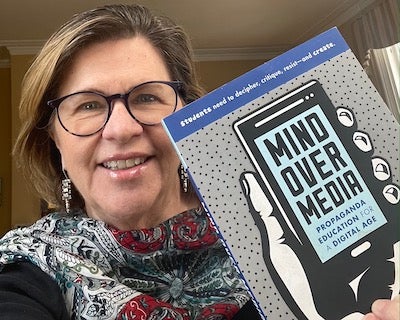Our faculty engage in cutting-edge research and produce innovative creative works every day as they bring new ideas to our students and our communities locally and globally. We’re pleased to continue this monthly spotlight series featuring our faculty’s work through a question-and-answer style article published on the first Friday of every month during the academic year.
Featured book: Mind Over Media: Propaganda Education for a Digital Age (Norton, October 2020) by Professor Renee Hobbs, Department of Communication Studies. This book received the Association of American Publishers 2021 PROSE Award for Excellence in Social Sciences.
Q: Can you give us a brief synopsis of your book?
Propaganda is inescapable. It’s everywhere. Students need to analyze, resist, critique―and create. Media literacy educators have always insisted that we are both creators and receivers of media messages. The truth of this is even more apparent in today’s digital environment, with children and adults alike participating in a ubiquitous, nonstop stream of social media. Clearly, students need the tools to interpret news and information critically―not just for school but for life in a “post-truth” world, where the lines blur between entertainment, information, and persuasion.
In this book, I demonstrate how a global perspective on contemporary propaganda enables educators to stimulate both the intellectual curiosity and the cultural sensitivities of students. Replete with classroom and online learning activities and samples of student work, this book provides a state-of-the-art look at the theory and practice of propaganda in contemporary society, and shows how to build learners’ critical thinking and communication skills on topics including computational propaganda, content marketing, fake news, and disinformation.
Q: How does the topic of digital and media literacy fit in with your research interests and/or passions?
I have been studying digital and media literacy education for 30 years. I have developed expertise on digital and media literacy education through research, community and global service. I wear many hats: as a researcher, teacher, advocate and media professional. I have worked to advance the quality of digital and media literacy education in the United States and around the world. As the Founder and Director of the Media Education Lab, my mission is to improve the quality of media literacy education through research and community service.
Q: Was there anything that surprised you while conducting research for this book?
American students in 1939 were more likely to receive propaganda education in schools than students in 2020. During the 1930s, the rise of mass communication tools like radio and movies led to more diverse forms of propaganda. Educators began introducing students to persuasive techniques used in mass communication. I also learned that the rise of the Common Core State Standards also explicitly rejected the study of propaganda, replacing it instead with a focus on logical argumentation. In discovering when propaganda genres were taught (and when they were not) in American public schools, this was among the most surprising findings.
Q: Why do you think in 2021, especially with the current global pandemic, the topic of propaganda is so important?
Propaganda is everywhere: it can be found in news and information, advertising, public relations, entertainment and activism. The rise of political polarization, the covid pandemic, and the events of the Capitol Siege make it clear how propaganda is a fundamental practice of contemporary society. People think propaganda is all bad, but it’s not. Activists create propaganda to change public opinion and seek democratic change. To improve society, you must be a propagandist to advocate for the change you seek.
Q: Does your new book, Mind Over Media: Propaganda Education for a Digital Age build on your previous book, The International Encyclopedia of Media Literacy in anyway? If so, how?
No, but this book builds on my crowdsourced learning tool, Mind Over Media: Analyzing Contemporary Propaganda, which I created in 2015. At this website, you can learn more about propaganda, upload examples of contemporary propaganda you find on your social media feed, and rate and comment on more than 10,000 examples of contemporary propaganda share by people from more than 50 countries. It’s an innovative form of digital learning for media literacy education. I was fortunate to be able to work with media literacy educators from Belgium, FInland, France, Croatia, Poland, and Romania to create this website, with support from the European Commission.
You can see it here: www.propaganda.mediaeducationlab.com
Q: For those reading Mind Over Media, what do you hope is the main takeaway?
For general readers: Everyone participates in the process of persuasion, which is the use of words and other symbols to influence people. People use persuasion to gain social power. But the term propaganda is generally used when someone is aiming to reach a large group of people, not just a few. Today, social media like YouTube, Facebook and Twitter make it easy for ordinary individuals to create or disseminate propaganda. If you are an activist, you may have created propaganda yourself. People who create propaganda have a specific goal and design a communication message that is intended to circulate among a large group of people and create a reaction. Propaganda involves reinforcing existing beliefs, changing perceptions, activating an emotional response or provoking a behavior. Propaganda is a vital practice of democracy and students in every field of study need to learn about it if they want to use the power of communication and information to make a difference in the world.
For educators: Teaching about propaganda is more important than ever before. Engaging learning activities can help students develop critical thinking skills that help them recognize and resist it.
~Organized by Taylor Petrini, English Major, URI Class of 2021

